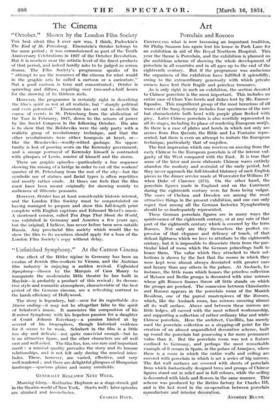The Cinema
" October." Shown by the London Film Society
Tui best silent film I ever saw was, I think, Pudovkin's The End of St. Petersburg. Eisenstein's October belongs to the same period ; it was commissioned as part of the Tenth Anniversary Celebrations in 1927 of the October Revolution. But it is nowhere near the artistic level of the finest products of that period, and indeed hardly asks to be judged as screen drama. The Film Society's programme speaks of its " attempt to use the resources of the cinema for what would in the graphic arts be called a cartoon or a caricature." Nut a good cartoon is terse and concentrated ; October is sprawling and diffuse, requiring over two-and-a-half hours for the showing of its thirteen reels.
However, the programme is certainly right in describing the film's spirit as not at all realistic, but " sharply political and even polemical." Eisenstein has set out to sketch the course of events in St. Petersburg from the abdication of the Tsar in February, 1917, down to the seizure of power by the Soviet Congress in the following October. His aim is to show that the Bolsheviks were-the only party with a realistic grasp of revolutionary technique, and that the other revolutionists were either bourgeois at heart, or— like the Mensheviks—woolly-witted gasbags. No oppor- tunity is lost of pouring scorn on the Kerensky government, and a savage- portrayal of Kerensky himself is contrasted with glimpses of Lenin, master of himself and the storm.
There are graphic episodes—particularly a fine sequence showing the raising of a bridge in order to cut off the workers' quarter of St. Petersburg from the rest of the city—but the symbolic use of statues and facial types is often repetitive and mostly rather crude. At • times one feels that the film must have been meant originally for showing mainly to audiences of illiterate peasants.
However, October has at leait considerable historic interest, and the London Film Society must be congratulated on having managed to prepare and show this full-length print complete with English captions and Edmund Meisel's music.
A shortened version, called Ten Days That Shook the World, was exhibited in Germany and America a few years ago, but the original, I believe, has never before been seen outside Russia. Any provincial film society which would like to show the film to its members should apply for a loan of the London Film Society's copy without delay.










































 Previous page
Previous page